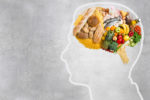Better Diet, Better Mental Health

Healthy eating is not only good for the body, but also for the mind.
It can be a challenge to eat a balanced diet, manage your weight successfully and reduce your risk of chronic disease. That is a hefty amount to put on your plate. With March as National Nutrition Month, however, you are invited to become more aware of adopting a healthy lifestyle by consuming fewer calories, getting daily exercise and making informed food choices.
The main purpose of National Nutrition Month is to help the public become more aware of the importance of good nutrition and a healthy eating plan. Fortunately, with a bit of discipline, you can master the steps it takes to embrace a healthy lifestyle. Besides reaping the physical benefits of a healthy diet, your mental health can benefit, as well. While eating nutritious foods can improve your heart health and reduce the risk of diabetes, certain cancers and high blood pressure, you can also boost cognitive function and minimize the effects of depression, anxiety and other mental health issues by making some healthy dietary changes.
While we may often think of boosting our brain capacity by learning something new, engaging in a spirited debate, or acquiring new experiences, what we eat can have a significant impact on the brain. One of the best ways to improve your mental health is to target your gut first. Your gut is what sends information to your brain. Ever notice how you might feel queasy when you are stressed, anxious or nervous? What’s in your gut can affect what your brain processes. If you want to help your brain function at its best so you can feel good both physically and mentally, here are a few delicious food suggestions to incorporate into your diet.
Focus on a heart-healthy menu
Stock your refrigerator and pantry with heart healthy proteins, such as fish, chicken, beans, eggs, nut butters, tofu and lean meat. Our brains are primarily made up of fat, and our bodies are incapable of manufacturing essential fatty acids without a diet comprised of omega-3s to meet our daily requirements, which help to boost learning and memory, as well as reduce the symptoms of depression, schizophrenia, and attention deficit hyperactivity disorder. Salmon, herring, sardines, mackerel, and chicken fed on flaxseed and walnuts top the list for omega-3 rich foods. Further, lean meat proteins aid in keeping serotonin levels balanced, which, when imbalanced, can influence mood and lead to depression.
Don’t forget some veggies and high fiber grains, either
Aim for a hearty selection of leafy greens, carrots, cabbage, tomatoes, pumpkin, sweet potatoes and asparagus. To keep your system running smoothly, be sure to incorporate some high fiber grains into your diet. These include whole grain pasta, quinoa, whole grain noodles, whole grain rice and corn. The complex carbohydrates found in whole grains release glucose slowly, which provides a feeling of fullness longer as well as a steady fuel source for the body and the brain. On the contrary, the simple carbohydrates found in processed and refined foods can aggravate a low mood by creating spikes in blood sugar.
There are healthier ways to satisfy a sweet tooth
For those with a sweet tooth, consider a variety of fresh fruit instead of chocolate, cakes, pies and other goodies. Keep a tasty selection of apples, oranges, grapes, bananas, berries, watermelon, pears, raisins and avocados on hand. Diary is equally important, so don’t forget to add some skim milk, yogurt and cheese to your healthy eating plan.
Acquire a taste for those leafy greens
If you are deficient in folate and other B vitamins, there is greater potential for depression, fatigue and insomnia. Aim for healthy amounts of spinach, romaine, turnip, mustard greens and broccoli, as well as beets and lentils.
Avoid the junk
There are certain foods to avoid, as well, and these include foods with added sugars, excess sodium, and both trans and saturated fats, which have been linked to increased risk of chronic disease. By minimizing consumption of these, you can help your body stay in top physical form which will also aid in improved brain power.
Although research suggests the foods we eat play a significant role in improved mental health, a sound diet is just a part of the overall picture. This is not a “one size fits all” plan. Your medical history plays a pivotal role in any lifestyle changes you might consider. Before undertaking any new diet or eating plan, be sure to have a conversation with your health care provider first. If you are struggling with any sort of mental health disorder, consult with a therapist or your family doctor.






